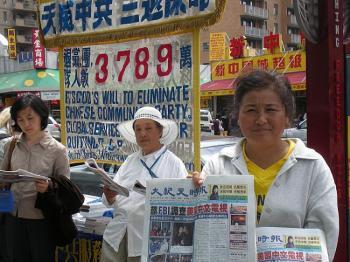It has been 38 hours since the strong earthquake in Sichuan on May 12. Tens of thousands of people in the disaster area still hang between life and death. Faced with the sudden terror and chaos, what are common people doing? Through the Internet, they have recorded things that happened around them.
The following are some excerpts taken from the Internet:
When the earthquake struck, we were at work on the second floor of a building in the Chengdu Hi-Tech Incubation Park. The building suddenly started to shake more and more violently. Most people could not comprehend what was happening at the beginning. They all stood up and looked at each other. One of the male colleagues joked, “It’s an earthquake, run quickly.” People started to react and began running. I followed along. When we reached the staircase, one of the female colleagues stopped, I pushed her to run quickly, but she kept turning, looking and waiting. Later I learned that she was waiting for her boyfriend, who is also a colleague of ours. At that moment of chaos, between life and death, it was inexpressibly touching.
There were many people. Starting from the fifth floor, everyone was running down the stairs. At the exit, a security officer was maintaining order, asking people not to panic and go to the empty space in the middle. At that time, the earthquake was still quite strong, one could hardly walk stably. The steel pipes in between the tall columns of the buildings were hitting each other as if they were jumping ropes, making noises. I was stunned, people everywhere were trying to make phone calls, but no connection could be made. I turned to look at the exit, the security officer was still there maintaining order, asking people to go to the middle area, not too close to the building.
…
I finally made it home and found things scattered across the floor. We had no time to tidy up as we were all afraid of aftershocks. Grabbing some clothes and food, we ran toward the empty space at Sanhuan. After I came out, I saw some small stores were still open. I pondered whether they would sell instant noodles for 10 yuan (US$1.43) now. But no prices were raised.
Nobody dared to go home, as we all lived in high-rise buildings and had to rely on elevators. So we organized to stay outside overnight. We listened to the car radio together. The radio station was asking people to donate blood. But there were only two sites and they were all relatively far away. A neighbor beside me said, “Let’s go by tricycle.” After a while, the person came back. Since the traffic was too heavy, it was impossible to make it through. The radio station then said there were too many people going there, the donors were lining up. I suddenly wanted to cry at that moment. I used my cell phone to get on WAP, QQ, and tried to call everywhere. Once I found some news, I did not dare to spread it casually, as I feared causing panic. I carefully verified them. When we learned that about 50 people had died in Chengdu, 400 in Deyang, and 7,000 in Beichuan, a female neighbor cried. Her eyes were red with tears circling inside, but she did not make a sound. Everyone quieted down to listen to the radio 91.4, trying to get news about Wenchuan. That kind of silence is dreadful, I could feel my own heartbeat.
…
Communication was still out. We suddenly received two messages. One was from a friend in Tianjin, and the other was from a friend in Guangxi. They were all worried about our safety. I replied: “I am so touched, we are safe.”
We continued to listen to the radio and learned about the situations in disaster areas. As we listened to the continuously rising death toll, all of us who were sitting together became very quiet. In front of natural disasters, human life is so insignificant. A friend said in a small voice, “This time I will definitely make a donation, though my salary is not high.”
…
We heard on the radio that a person claiming to be the chair of the Chengdu Car Club called in. He said that all vehicles in their car club could go support the disaster areas, they were just waiting for an order from the relevant government department. The radio station suggested not doing so, as the most important thing in such a moment is to have effective self-help organizations. The chairman left his phone number and said he would wait for further news. A while later, he called in again to say, “We are ready to take off!”
Dujiangyan No. 1 People’s Hospital had too many wounded and was asking for emergency help. The radio station called on taxis to help. In a short while, the station reported back that the roads were covered with green cars. And a while later there was news that too many taxis went there. The hospital began organizing some to go to other needed areas. A taxi called in to describe the situation; he had already transported a wounded person to Chengdu. He was going to make a second trip.
…
Net friend: In the face of crisis, there are always many small potatoes, small incidents that touch people’s heart. I heard a lot of news, including an on-duty police officer calling in to offer help in inquiring about the safety of his hometown, since he could not leave his post. Too many people wanted to rush back to Wenchuan overnight, and Dujiangyan. … There were so many I could not remember.
Net friend: … when faced with major disasters, the true Chinese people are these ordinary common people!



